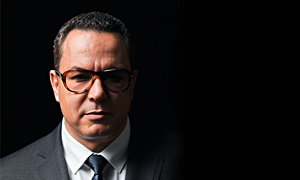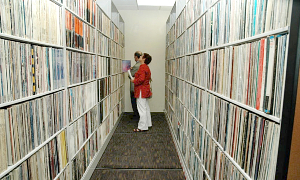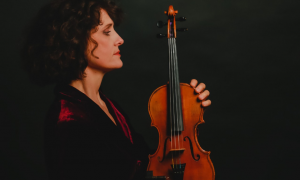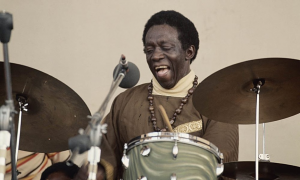Home » Jazz Articles » Chats with Cats » The Archive Curator: Judith Korey
The Archive Curator: Judith Korey
We’re constantly creating content so that anything that is here will be preserved and available to people of future generations. That’s really the goal that we have here.
—Judith Korey
 Thankfully, there are places dedicated to this preservation as well as people who have painstakingly curated and protected these institutions. As important as these collections are in preserving the past, they are even more valuable when they assist in the continued growth of the art form. Such is the case with the Felix E. Grant Archives in Washington D.C. Not just a museum, the Archive is a living, breathing research center that houses tens of thousands of recordings and documents yet is also closely affiliated with the University of D.C. Jazz Performance program which is producing the next generation of artists. While it safeguards the past it is also documenting the future.
Thankfully, there are places dedicated to this preservation as well as people who have painstakingly curated and protected these institutions. As important as these collections are in preserving the past, they are even more valuable when they assist in the continued growth of the art form. Such is the case with the Felix E. Grant Archives in Washington D.C. Not just a museum, the Archive is a living, breathing research center that houses tens of thousands of recordings and documents yet is also closely affiliated with the University of D.C. Jazz Performance program which is producing the next generation of artists. While it safeguards the past it is also documenting the future. An important figure in this conservation is professor and curator Judith Korey. head of the University of D.C. music program. She also curates the Felix E. Grant Archives and has done so since its inception. Her passion for her responsibilities was evident as she detailed the history, current status and future of these Archives.
About Judith Korey
Born and raised in Philadelphia, Judith Korey is a graduate of Chestnut Hill College. She went on to study for a doctorate at Catholic University, during which time she started teaching music theory at the University of the District of Columbia (UDC). She later went on to design the music program there.Professor Korey currently serves as the Music Program Coordinator in the Division of Arts and Humanities, College of Arts and Sciences and previously acted as chairperson for the Department of Visual and Performing Arts. In addition to her administrative and teaching assignments, she is curator of the University's acclaimed jazz research and resource center, the Felix E. Grant Jazz Archives.
In 2008 she was awarded the University of the District of Columbia's Dr. Cleveland Dennard Service Award, which is presented to an individual who has demonstrated a long-term commitment of outstanding service to the University. In 2015 she received the Accomplishment in Leadership Award from the College of Arts and Sciences, and in 2016 the University presented her with the Pathmaker Leadership Award. Professor Korey was also honored with the 24th Annual Mayor's Arts Award for Excellence in Service to the Arts-2009, and the Jazz Journalist Associations Jazz Hero Award in 2017.
All About Jazz: You've been a music professor and have designed the music program at the University of D.C. Is that program mostly classical, is it mostly jazz, or is it both?
Judith Korey: The degree programs are in traditional classical, and we have jazz and gospel music programs as well. Now, the gospel program was the first in the nation to offer a degree in gospel music and, of course, the jazz we've had since 1984. We offer bachelor's and associate's degrees in those three areas.
AAJ: What about your own background? What was your primary instrument, and did you study jazz in your own musical education?
JK: I studied piano as my main instrument and mostly studied classical music in Philadelphia from where I originally came. Then I came to Washington to do graduate work at the university here. I've always listened to jazz but when I started working at the Federal City College, which became the University of D.C., we had some of the great jazz musicians teaching here and I took the opportunity to expand on that and really work with them. I would go in their classes and eventually started playing. I don't consider myself a jazz musician but I've become much more acquainted with it and the music itself.
But, I played with the ensembles and worked with Calvin Jones who was the director of the jazz program here until his passing. This goes back to the '70's when I started. So most of my work with jazz has been since coming to Washington, which has been for quite a long time now.
AAJ: It's interesting that as a professor you were studying with some of the other professors
JK: You never stop learning and that's one of the things that kept me here. It was growth for me as well because it's a whole other world.
AAJ: How is the music program there faring in the current environment?
JK: Well, COVID has really taken the breath out of everybody, I think, because music relies so much on community and there's only so much you can do, particularly with ensembles, in not having that. But we got through it. We've been back the last couple of years and the program is developing. We have a wonderful choir and big band. We have a big band festival that's been going since 1987 and features three of the local universities, Howard University in Washington D.C., and also the University of Maryland.
The program is still here. Hopefully, more will be happening in upcoming years. I think the big thing now is seeing what they're doing in the public schools because so much of what we do really depends on the people we're getting from there and making sure that music is still an integral part of the curriculum.
There is a tendency now that everybody just wants to forget about instruments and put down beats. Everybody wants the quick fix. Plus, I think it's an important thing that instrumental music is open to the students coming in because in a lot of the public schools it's just not there anymore.
AAJ: Of course, I need to ask you about the Felix E. Grant Jazz Archives and your role in it. Could you tell me about that?
JK: Sure. I've been working with the archives since its inception. It's been a wonderful opportunity. The archive itself goes about 35 years to the early '90s when one of the very well-known broadcasters from this area donated his collection to the music program at the university. That was the beginning of the archives.
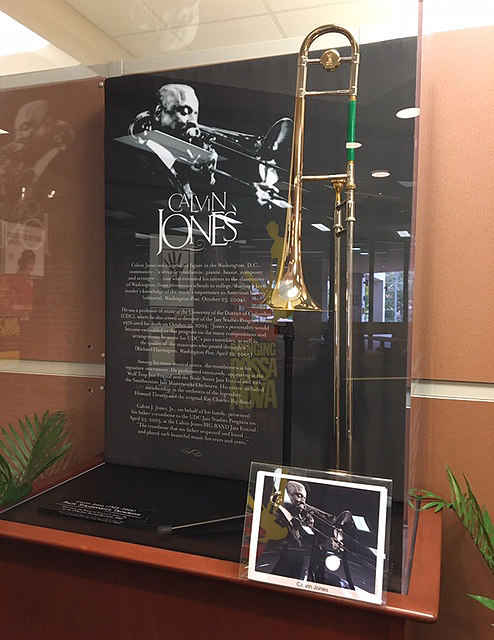 But it has grown since then. It's the only jazz-specific archives in the Washington area and it has had a substantial impact on the jazz community and the local community both because of its history, and, also, because of its close affiliation with the jazz performance program. We're very closely related to that so everything we do is not just an archive or a museum, it's an active resource center. We combine it with the program to present concerts, jazz forums and a lot of events that are really important to the community.
But it has grown since then. It's the only jazz-specific archives in the Washington area and it has had a substantial impact on the jazz community and the local community both because of its history, and, also, because of its close affiliation with the jazz performance program. We're very closely related to that so everything we do is not just an archive or a museum, it's an active resource center. We combine it with the program to present concerts, jazz forums and a lot of events that are really important to the community. So, it's a research and resource center dedicated to the study, preservation and continuing development of jazz. But it's also unique in the sense that we're closely connected to the jazz performance program.
AAJ: Is it just audio recordings or is there a variety of materials?
JK: We're moving from our old facility to be housed in the new D.C. archive which is being planned now to be completed in about three and a half to four years. It's going to be a wonderful facility. We have thousands and thousands of records. We've had major donations from individuals over the years. It's a who's who of music. In addition to Felix Grant's collection, we have the collection from WDCU-FM Jazz 90 which is a station we lost in 1997 because of a political situation we had at the time where there was a deficit and the station was sold.
But, along with that collection came materials from Will Friedwald, one of the great writers and critics. He donated his and his father's collection which is LP recordings that cover the history of jazz from early New Orleans style to avant-garde.
We have contributions from W. Royal Stokes who was a writer; John Hasse, who was the former curator of the Museum of American History; Ronnie Wells, who was the founder of the East Coast Jazz Festival; William Brower, who was an important writer, historian and producer; A.B. Spellman and Karen Spellman who co-produced the Capital Jazz Fest. There's another huge collection from George Hall who was a well-known discographer. His collection alone has 10,000 LPs, 11,000 pristine 78s, and CDs that are just remarkable.
All of these materials are in the archive. So, it covers a wide range of audio recordings and video as well. And, in addition to what we have in terms of the commercially issued recordings which cover the wide history of jazz, we create our own content. All of the different programs that we have here, including the Jazz Forum series which has been around since 2009, are recorded and videoed. They're up on our digital collection. Some of these things you can see now if you go to our digital collection at the website, and others are on our YouTube channel.
In addition to the concerts, we have a "Meet the Artist on the Bandstand." The head of our Jazz Department, Allyn Johnson is probably one of the leading pianists today, at least in this area. He's created this program where there's a conversation and a performance. The artist comes and they talk, and they play, and it really gives insight into the artist outside of being a performer. We've had a who's who of people that have come through. These are all videoed and they're up on our YouTube channel and eventually on to our digital collection in the archives.
Our big band festival, which began in 1987, has been going on since then with the exception of the COVID years. We have the audio recordings of those and, starting from 2005, video recordings, and those are also part of our digital collection and up on our YouTube channel.
So, we're constantly creating content so that anything that is here will be preserved and available to people of future generations. That's really the goal that we have here. We have thousands and thousands of commercially issued recordings as well as these original materials that have been created that are all part of the archives.
It's a wonderful resource, not only for the university, but for the city, and requests that we get from all over the world. Felix Grant, when he was broadcasting, was probably one of the most influential people in bringing Brazilian music to the United States. So, we get a lot of requests for that because he was playing this music in the late '50s before it was popular and this connection to Brazil was developed. He was really instrumental in introducing this music into the States.
So, there's a wealth of material we also have from the video station. We're working with the HBCU Preservation Project and I think that's really important because so many things were done on that station that we have and are also preserving. In addition to the music and artistic part of it, it had a great effect on the community. There were a lot of community-based shows on that. So, we're working on preserving those and keeping those in the digital collection so people can have access to those as well.
I'm, basically, curator of it. Unfortunately, our archivist, the great Reuben Jackson, passed away suddenly this past February. We'll be looking for an archivist to fill his position but I've been working as curator since its inception. I've seen it go from Felix Grant's collection to what it is today where it's just a wonderful resource for the community.
AAJ: How do you decide what should be included in the collection?
JK: The acquisition policy is that we're interested in anything about jazz but we're most interested in things that document the history of jazz in this area. We're at the point now where we have to be a bit more discretionary in terms of what we have and not duplicate materials. We want anything that's going to increase the research value and the utility of our holdings, particularly recordings, photographs, radio broadcast materials and manuscripts. We take archival materials in all aspects of jazz but of special interest in materials that document jazz in the Washington D.C. area and materials that complement existing records that we have.
AAJ: That leads to my next question about jazz in the Washington D.C. area. I read that you were a contributor to the book "D.C. Jazz: Stories of Jazz Music." Is there an important history of jazz there?
JK: Well, yes. Sometimes people think it's just in New Orleans and New York. People like to talk about certain cities but Washington has a very strong background. Duke Ellington was born here. Felix Grant was a great fan of Duke Ellington and he spent a lot of time finding the places where he lived and also where he was born. He identified where he was born and there's a plaque on that building now. We had a ceremony for that and everything.
But this whole area, we call it the DMV—D.C., Maryland and Virginia—has a very rich history. If you look into the background of the artists that have come here, there are some major performers. Some have just decided to move here and create their musical life here but there's really quite a rich history of jazz in D.C. People like Shirley Horn. I could go on and on with names of people from this area. If you look at our collection it's a good place to start.
AAJ: Is there currently a healthy live scene there?
JK: You always have to remember that in addition to being just a city, it's the nation's capital. So, we have all of the activities that go on at the Kennedy Center which has a very strong jazz program. We have the Smithsonian Institution and the Smithsonian Jazz Masterworks Orchestra. Charlie Young, who also teaches at Howard University, is now in charge of that.
Like any place, some venues have closed during COVID, but others are opening up. But a lot of these things are not just in the traditional club scene. There are a lot of performances that go on just in the universities in this area. You have University of D.C., George Washington University, Georgetown University, University of Maryland, Catholic University, George Mason University, and all of them have good programs. Even if they don't have strong academic programs the music is still there.
There's always room for more but there's also a strong group of activists who are working for that. We have Herb Scott who's with the Capital Jazz Foundation, and who is with the D.C. Commission of the Arts now, had been very active in bringing people together to really work on this to make sure that there's a vibrant community of jazz here in this area.
AAJ: That being said, are you optimistic about the future of jazz in the area and the health of your music program.
JK: You've got to be optimistic. I guess if I weren't... There are always hurdles that you have to overcome but the music is so powerful that I think it will overcome it. As long as there are people who love good music, I think it will be here. We're here to facilitate that. The people who are really involved in this are people who love the music and are going to make sure. I can't predict the future but that's why I'm here.
Tags
Chats with Cats
B.D. Lenz
United States
District Of Columbia
Washington
Washington D.C.
Philadelphia
Calvin Jones
New Orleans
East Coast Jazz Festival
Capitol Jazz Festival
Allyn Johnson
New York
duke ellington
Shirley Horn
Kennedy Center
Smithsonian Institution
Felix E. Grant Archives
Comments
PREVIOUS / NEXT
Support All About Jazz
 All About Jazz has been a pillar of jazz since 1995, championing it as an art form and, more importantly, supporting the musicians who make it. Our enduring commitment has made "AAJ" one of the most culturally important websites of its kind, read by hundreds of thousands of fans, musicians and industry figures every month.
All About Jazz has been a pillar of jazz since 1995, championing it as an art form and, more importantly, supporting the musicians who make it. Our enduring commitment has made "AAJ" one of the most culturally important websites of its kind, read by hundreds of thousands of fans, musicians and industry figures every month.














